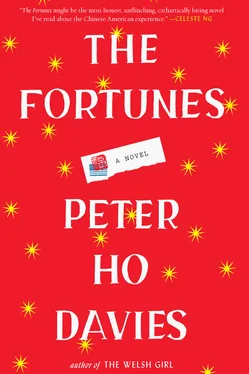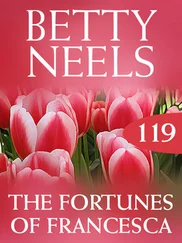He’d gone to Caltech the following fall (Stanford, his first choice, turned him down; he always fretted about checking the Asian American box amid persistent rumors of admissions quotas). There, as a freshman, he’d first heard the derogatory term banana, meaning yellow on the outside, white on the inside, but he’d secretly welcomed its aptness. As far as he was concerned, his skin had always been something to trip on.
But now he was ashamed that these whites, from Boise and Athens, Knoxville and Reno, knew more about Chinese culture than he did. Being in China gave him the same sense of shame as going to a Chinese restaurant with colleagues who wanted him to tell them “what’s good.” He’d actually blushed when people on the trip had deferred to him and he’d had to explain that he didn’t speak Chinese.
“And you’ve never been to China before?” they ask him at least once a day, as if in amazement, as if waiting for him to change his story. ( That’s right, slapping his forehead, how could I forget? I’m the Manchurian candidate. )
These decent, kindly people remind him of why he hates American Buddhists, could never become one. He couldn’t stand the thought of having some white person teach it to him. It’s the same reason he’s never learned martial arts. (“Gertie’s going to learn gung fu,” Alice says. “She has to be able to stand up to bullies.” But in John’s memory the bullies were the ones who knew kung fu.) As a child he’d hated losing at Chinese checkers too.
John’s list of things you couldn’t do if you were Asian American: play ping-pong, play piano, wear glasses (he had saved up for Lasik the summer of his junior year), wear a camera round your neck, ride a bike, drive an import, grow a mustache (or, if female, streak your hair), wear a sweatband, drink beer, ace tests, sing karaoke (though deep down he’d always dreamed of singing the old Johnny Rivers number “Secret Agent Man” as “Secret Asian Man,” but then, wasn’t that every Asian American’s dream, to sing karaoke and somehow still look cool?). He’d actually emailed this list to his old friend Ken a few years back, when they’d briefly reconnected after John’s book came out. Ken — now going by Kensuke — was working for an Asian American social media startup out of Palo Alto: Yello! Maybe that’s why he no longer had a sense of humor. “But if you reject every stereotype,” he’d written back, “what do you have in common with other Asians?”
And now John wants to scandalize these well-meaning souls on the tour by telling them how much he loves chop suey, General Tso’s chicken, and all those other fake Chinese dishes. Takeout, after all, was the only Chinese food he’d known growing up (his father had taught his mother simple Western dishes, but she didn’t cook Chinese, her family having always had servants to cook for them). It was his comfort food, and he never failed to miss it when he walked into authentic Chinese restaurants. His favorite meal on the trip had been on a flight, the tinfoil container reminding him of takeout. He even loved fortune cookies, the stupider and more ungrammatical the better. ( Recent plants will work out fine; Something long desired is about to happy. “You only like the ones that can’t come true,” Nola scolded him. “But that’s why you add in bed to the end,” he reminded her.) He wants to tell them that when he was a kid Kung Fu was his favorite show, even with white David Carradine in the lead (even after he knew that Bruce Lee had been passed over for the role because of his accent). And why not? he’d once fumed at a dinner with college friends. The character was supposed to be half white, after all. He was on a quest to find his white stepbrother, for crying out loud. But all anyone remembered was the blind monk calling him “Glasshopper.” ( Grass hopper, grass hopper, grass hopper, John had muttered under his breath.) Kids had whispered it whenever a teacher called on him in class, cracking up at their desks, and still he loved the show. The character spoke to him, and it infuriated John to have to be ashamed of that, to have his white friends question his authenticity. Whatever I am is authentically me, isn’t it? he wanted to shout. But he wasn’t always sure.
Once when he’d asked Napoleon if they might see Peking Man — that shared ancestor — someone had piped up, “ Beijing man.” The site was too far from the city, Napoleon explained apologetically, and besides, the actual bones were missing, lost or stolen during the evacuation before the Japanese invasion. At least, to John’s immoderate satisfaction, according to his guidebook Peking Man and Peking duck still went by their old romanized names.
“They don’t mean anything by it,” Nola had tried to tell him the night before, after yet another group discussion of the importance of Chinese culture.
Jeannine has been taking Chinese cooking classes. I want her to know what it really tastes like, without the MSG. Eric and Scott have already found a Chinese tutor in San Francisco. Alice is applying for a TESL job in Shanghai — she wants to come back and live in China with her daughter. I want it to be real for her. “And we’re all going to keep the babies in traditional split pants rather than diapers, right?” John asks to shut them up. It’s like they’re wrestling over a lazy Susan, everyone else spinning it one way, he the other.
“They make me feel like there’s something wrong with me, with the way I was brought up,” he told Nola.
“There’s something wrong with the way we were all brought up,” she said. “If you believe the parenting books. None of us are going to parent like our parents.”
“Thanks for the sympathy.”
“Come on, John! Maybe you should write about it if you care so much. At least it’d be…”
“What?” He glared at her.
“I don’t know! Real.”
“It’d be real if I wrote about feeling inauthentic?”
“Honest, then.”
He thought about wounding her. And what about you? What are you writing? “Nothing” has been the answer for so long that he’s long stopped asking, but now he suspects she’s started again in secret, since the abortion, and he realizes he’s scared of what she might answer.
John hesitates in the lobby. He’s not set foot outside the hotel alone. He has some premonition, some fear that if he does, he’ll never come back, that he’ll disappear into the crowd. It’s ridiculous, but he remembers a story about some uncle who’d returned to China from Singapore on a visit as a child — it must have been in the thirties — and almost been kidnapped. John can’t recall the details; probably there weren’t any. The uncle would have been a small boy at the time ( Of course, no one would kidnap a girl, he’d assured his daughter, John’s cousin); perhaps he just imagined it. And yet there it is, some irrational fear, the same anxiety that has kept John away all these years. It’s probably fueled by his own childhood images of China: crowds in Mao suits waving Little Red Books. Back then the Communist countries — China, the Soviet Union — seemed like prisons for their citizens. He went to a Halloween party once as the Tank Man, the unknown and likely disappeared fellow who’d faced down the tanks in Tiananmen Square. White shirt, black pants, laden with plastic bags in each hand. No one got it. The most iconic Chinese figure of the decade, and no one recognized him. The nearest anyone guessed was “Delivery guy?” Several of his friends seemed puzzled that he’d come as another Chinese, as if it weren’t a costume.
Mostly, though, there’s some essential math at play here. How do you expect to take one of theirs without them taking one of yours? Gotcha! indeed.
Читать дальше












